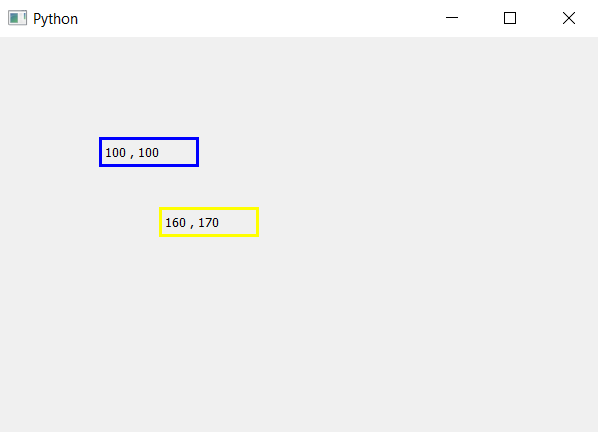La ventana principal en PyQt5 es como un gráfico que tiene un eje x y un eje y, todos los widgets están posicionados de acuerdo con sus coordenadas x, y. Cuando creamos la etiqueta se forma en la esquina superior izquierda, las coordenadas de la izquierda son (0, 0), podemos mover la etiqueta usando el move()método.
En este artículo, veremos cómo obtener las coordenadas de la etiqueta. Para ello utilizaremos x()el método para la coordenada x y el y()método para la coordenada y.
Sintaxis:
x_position = label.x() y_position =label.y()Argumento: Ambos métodos no aceptan argumentos.
Retorno: ambos devuelven un número entero.
Código:
# importing the required libraries
from PyQt5.QtCore import *
from PyQt5.QtGui import *
from PyQt5.QtWidgets import *
import sys
class Window(QMainWindow):
def __init__(self):
super().__init__()
# set the title
self.setWindowTitle("Python")
# setting the geometry of window
self.setGeometry(60, 60, 600, 400)
# creating a label widget
self.label_1 = QLabel(self)
# moving position
self.label_1.move(100, 100)
# setting up the border
self.label_1.setStyleSheet("border :3px solid blue;")
# getting x and y co-ordinates
x = str(self.label_1.x())
y = str(self.label_1.y())
# setting label text
self.label_1.setText(x+", "+ y)
# creating a label widget
self.label_2 = QLabel(self)
# moving position
self.label_2.move(160, 170)
# setting up the border
self.label_2.setStyleSheet("border :3px solid yellow;")
# getting x and y co-ordinates
x = str(self.label_2.x())
y = str(self.label_2.y())
# setting label text
self.label_2.setText(x + ", " + y)
# show all the widgets
self.show()
# create pyqt5 app
App = QApplication(sys.argv)
# create the instance of our Window
window = Window()
# start the app
sys.exit(App.exec())
Producción :
Publicación traducida automáticamente
Artículo escrito por rakshitarora y traducido por Barcelona Geeks. The original can be accessed here. Licence: CCBY-SA